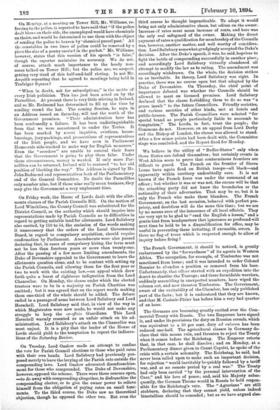On Tuesday, Lord Onslow made an attempt to confine the
vote for Parish Council elections to those who paid rates with their own hands. Lord Salisbury had previously pro- posed merely to leave the levying of the Parish rate outside the compounding laws. Lord Onslow advocated disenfranchise- ment for those who compounded. The Duke of Devonshire, however, opposed the scheme. There were three courses open,
do away with compounding altogether, to disfranchise the compounding elector, or to give the owner power to relieve himself from the obligation of paying rates on small tene- ments. To the third course, the Duke saw no theoretical objection, though he opposed the other two. But even the third course he thought impracticable. To adopt it woul& bring not only administrative chaos, but odium on the owner.. Increase of rates must mean increase of rents, and here was the only real safeguard of the owner. Making the direct payment of rates a qualification for membership of the Councils was, however, another matter, and well worthy of considera- tion. Lord Salisbury somewhat grudgingly accepted the Duke's decision. After the Duke's speech, it was, he said, hopeless to fight the battle of compounding successfully in another place,. and accordingly Lord Salisbury virtually abandoned all attempt to modify the law as to rating. The amendment was accordingly withdrawn. On the whole, the decision strikes us as inevitable. In theory, Lord Salisbury was right. In practice, there was no course open but that adopted by the Duke of Devonshire. On Thursday, the chief point of importance debated was whether the Councils should be- allowed to meet on licensed premises. Lord Salisbury declared that the clause forbidding them to do so was "a grave insult" to the future Councillors. Friendly societies, and various societies of other kinds, met at hotels and public-houses. The Parish Councillors were selected "for special brand as people particularly liable to succumb to. temptation." The Lords, in fact, trust the people; the Commons do not. However, on an appeal from Lord Derby and the Bishop of London, the clause was allowed to stand. After a few minor points had been dealt with, the Committee stage was concluded, and the Report fixed for Monday.






































 Previous page
Previous page